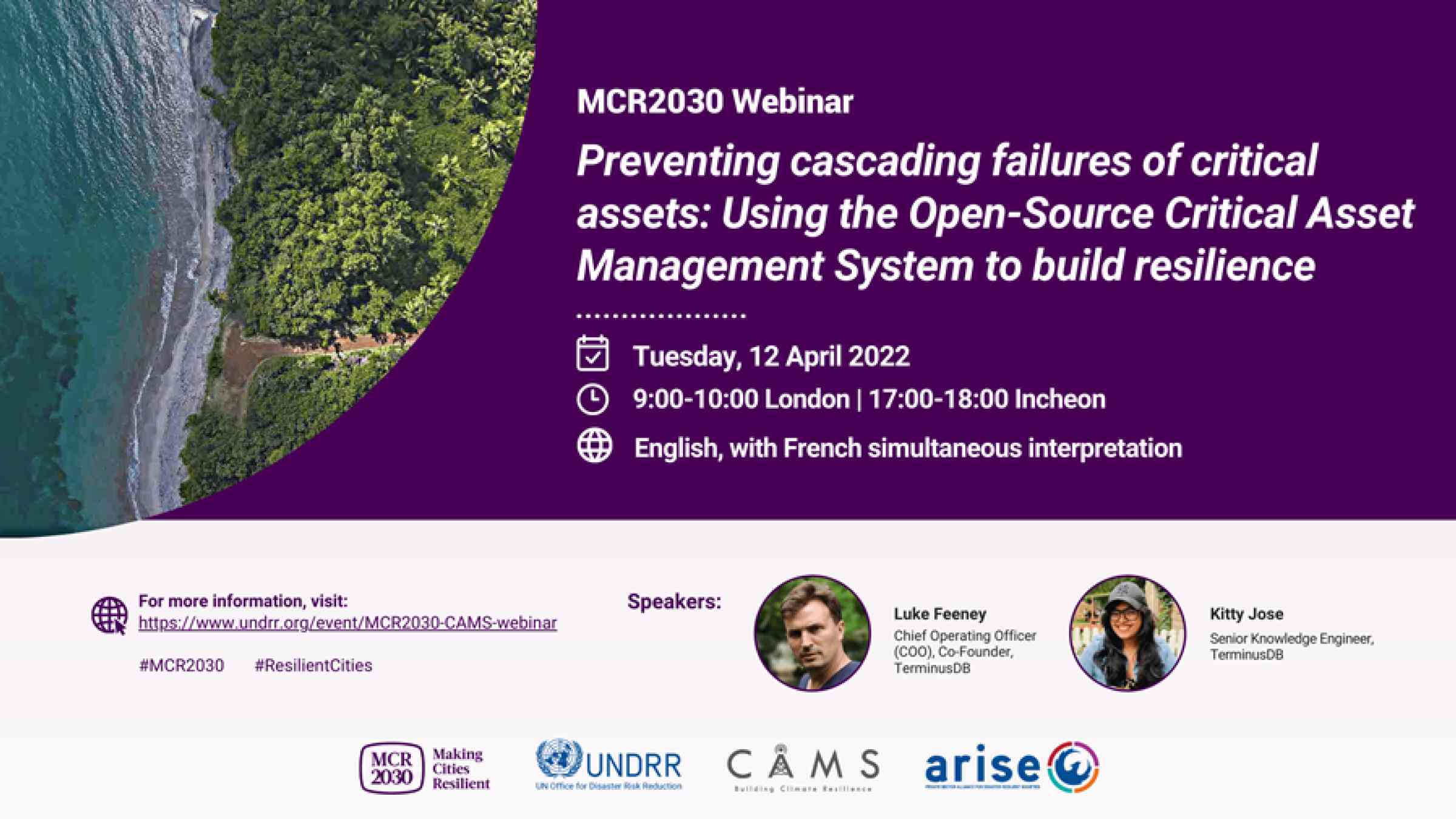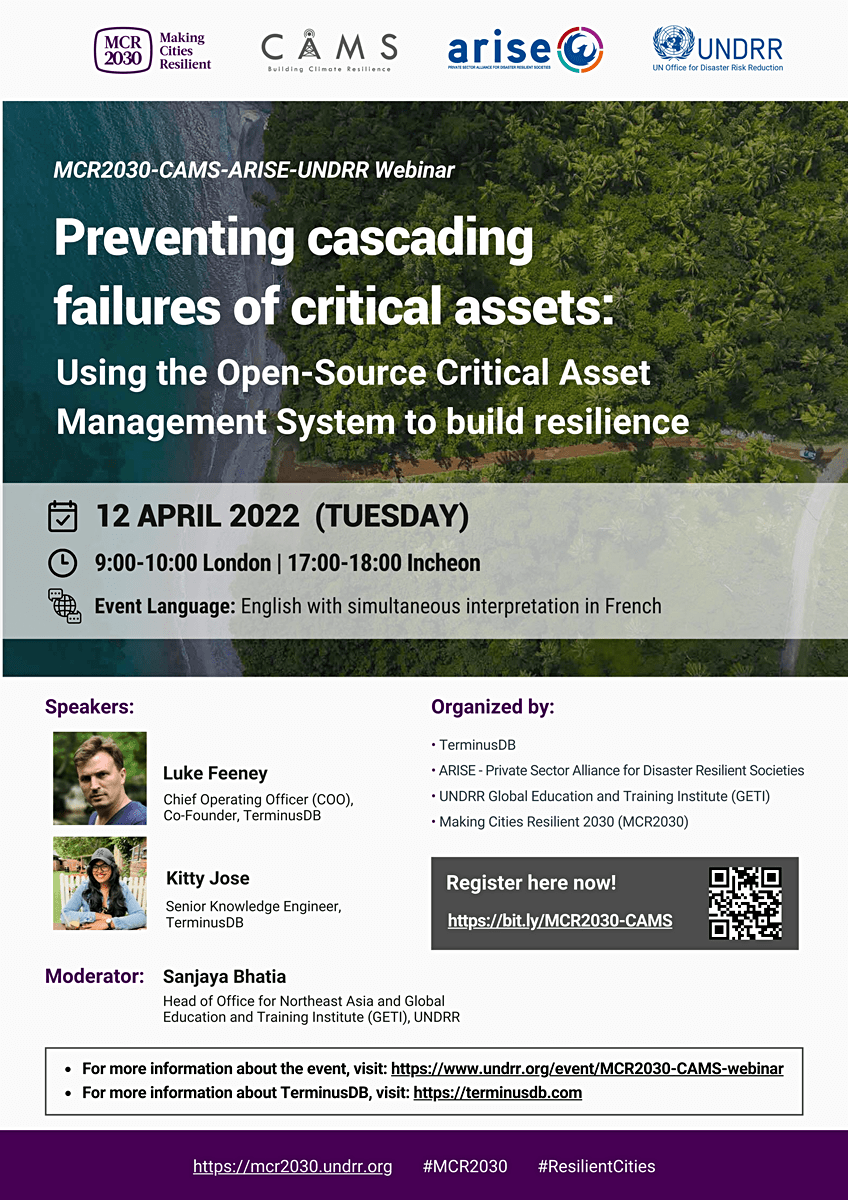[MCR2030-CAMS-ARISE-UNDRR Webinar] Preventing cascading failures of critical assets: Using the Open-Source Critical Asset Management System (CAMS) to help cities become disaster and climate resilient

- English

Webinar Recording:
Event Description
The Critical Asset Management System (CAMS) is a collaborative, open-source, and data-centric tool that helps cities to identify their critical assets and the cascading failure chains should one of them fail.
Climate change is increasing the risk of extreme weather events all over the world. Often it is not those responsible for greenhouse emissions who suffer the worst consequences. Island nations, cities, and communities run the risk of devastation from natural hazards, stresses, and shocks. Governing bodies need to be resilient to these hazards to reduce their impacts, rebuild better and efficiently and save lives.
Protecting critical assets is essential to ensure city’s resilience. While a city may be able to identify many of its critical assets, there are still several major gaps to be addressed. For example:
- Do you know which critical assets could affect the city’s disaster and climate resilience?
- Do you understand the risk that each asset faces and how well placed it is to deal with that risk?
- Do you understand how assets are interconnected and the chained consequences that may result?
Without understanding, these gaps, shocks and stresses can lead to failure chains which can significantly weaken resilience. The goal of CAMS is to help cities plan, protect critical assets, and respond to inevitable disasters to save lives and rebuild faster.
This webinar will be divided into two parts: the introduction to the CAMS tool and the demo of its usage. The CAMS tool is available for MCR2030 cities on the MCR2030 dashboard at https://mcr2030dashboard.undrr.org/directory/service/153
Key questions
- What is CAMS, who is behind it, and what do you mean by open source?
- How did the idea for CAMS come about and a look at the pilot in Dominica?
- What is the technology and approach being used to develop CAMS?
- How can cities use CAMS to prevent critical asset failures?
- How can CAMS help cities and communities become climate-resilient?
Speakers
- Luke Feeney, Chief Operating Officer (COO), Co-Founder, TerminusDB
- Kitty Jose, Senior Knowledge Engineer, TerminusDB
Moderator:
- Sanjaya Bhatia, Head of Office for Northeast Asia and Global Education and Training Institute (GETI), UNDRR
Organizers
- TerminusDB
- ARISE – Private Sector Alliance for Disaster Resilient Societies
- UNDRR Global Education and Training Institute (GETI)
- Making Cities Resilient 2030 (MCR2030)
About TerminusDB
TerminusDB is an open-source graph database and document store, and a toolkit for building collaborative applications. The company are part of the CAMS open-source voluntary project led by ARISE-US, a private-sector advisory group to the United Nations Office for Disaster Risk Reduction (UNDRR) to help cities and communities that are most vulnerable to climate change become climate resilient with the help of cutting-edge technology.
For more information: https://climateresilient.world/ or https://terminusdb.com/ or https://mcr2030dashboard.undrr.org/directory/partner/207
About ARISE – Private Sector Alliance for Disaster Resilient Societies
ARISE, the Private Sector Alliance for Disaster Resilient Societies, is a network of private sector entities committed to helping to implement the Sendai Framework, and led by UNDRR. ARISE is organized into national networks, of which there are currently 28 worldwide. Like other ARISE country networks, ARISE-US carries out pro-bono projects to address aspects of disaster risk reduction within its home country and more broadly, of which CAMS is one".
About the UNDRR Global Education and Training Institute (UNDRR GETI)
UNDRR GETI was established in 2010 to develop a new cadre of professionals in disaster risk reduction and climate change adaptation to build disaster resilient societies. GETI has a global mandate to provide capacity building support to mainstream disaster risk reduction and climate change adaptation into sustainable development; convene and support inter-city learning to strengthen resilience (Making Cities Resilient); and to provide capacity building and best practice sharing support to national training institutions working on resilience issues. Based in Incheon, the Republic of Korea, UNDRR GETI is also the global secretariat of the Making Cities Resilient 2030 (MCR2030).
About the Making Cities Resilient 2030 (MCR2030)
Making Cities Resilient 2030 (MCR2030) is a unique cross-stakeholder initiative for improving local resilience through advocacy, sharing knowledge and experiences, establishing mutually reinforcing city-to-city learning networks, injecting technical expertise, connecting multiple layers of government and building partnerships.
Through delivering a clear 3-stage roadmap to urban resilience, providing tools, access to knowledge, monitoring and reporting tools. MCR2030 will support cities on their journey to reduce risk and build resilience.
MCR2030 aims to ensure cities become inclusive, safe, resilient and sustainable by 2030, contributing directly to the achievement of Sustainable Development Goal 11 (SDG11) “Make cities and human settlements inclusive, safe, resilient and sustainable”, and other global frameworks including the Sendai Framework for Disaster Risk Reduction, the Paris Agreement and the New Urban Agenda.
For more information: https://mcr2030.undrr.org/
For more information
MCR2030 Global Secretariat at [email protected]

